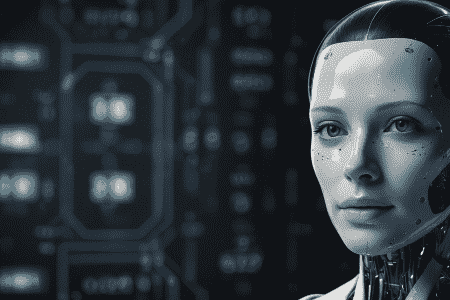
Optimizing Recruitment ROI: How AI-Driven Interviews Drive Results
Introduction
In the fast-paced world of recruitment, finding and hiring the right talent is critical for business success. However, traditional recruitment methods often fall short in terms of efficiency, accuracy, and cost-effectiveness. This is where Artificial Intelligence (AI) comes in, revolutionizing the recruitment process and driving better results for businesses. AI-driven interviews, in particular, are transforming the way organizations identify and hire top talent. This article explores the benefits of AI-driven interviews and how they can help organizations optimize their Recruitment Return on Investment (ROI).

The Evolution of Recruitment
Recruitment has evolved significantly over the years, from newspaper ads to online job portals. However, these methods still rely heavily on manual effort and are often prone to bias. AI-driven interviews leverage machine learning algorithms to analyze candidate responses, facial expressions, and other non-verbal cues. This allows recruiters to assess a candidate's suitability for a role more objectively and efficiently.
Benefits of AI-Driven Interviews
- Efficiency:AI-driven interviews can screen a large number of candidates quickly, reducing time-to-hire and ensuring that top talent is not overlooked.
- Accuracy: AI algorithms are designed to eliminate bias from the hiring process, ensuring fair and consistent evaluations of candidates.
- Cost-Effectiveness: Recruiting can be an expensive process, but AI-driven interviews help reduce costs associated with traditional recruitment methods.
- Improved Candidate Experience: Candidates appreciate a streamlined recruitment process. AI-driven interviews offer candidates the flexibility to complete interviews at their convenience, enhancing their overall experience.
Case Studies and Success Stories
Numerous organizations have embraced AI-driven interviews and have witnessed remarkable results. For instance, a leading technology company reduced its time-to-hire by 40% after implementing AI-driven interviews. Another organization experienced a 30% increase in the diversity of its hires by leveraging AI to eliminate bias from its recruitment process.

Challenges and Considerations
Despite their benefits, AI-driven interviews present certain challenges. Ensuring that AI algorithms are fair and unbiased is paramount. Recruiters must also be trained to use AI tools effectively and interpret the data they generate accurately to make informed hiring decisions.
Future Trends in AI-Driven Interviews
The future of AI-driven interviews is promising. Advancements in natural language processing and machine learning continue to enhance the sophistication of these interviews. In the coming years, AI-driven interviews are poised to play an even more significant role in the recruitment process, offering deeper insights and greater efficiency.

Implementation of AI-Driven Interviews
Implementing AI-driven interviews requires careful planning and consideration. Organizations need to choose the right AI tools and platforms that align with their recruitment goals. Additionally, training recruiters to use these tools effectively is crucial for success. Integrating AI-driven interviews into existing recruitment processes can lead to significant improvements in efficiency and effectiveness.
Measuring the ROI of AI-Driven Interviews
Measuring the ROI of AI-driven interviews involves evaluating various factors, including cost savings, time-to-hire, quality of hires, and candidate experience. By tracking these metrics, organizations can determine the effectiveness of their AI-driven interview processes and make adjustments as needed to optimize ROI.

Addressing Ethical and Legal Considerations
AI-driven interviews raise important ethical and legal considerations, particularly regarding data privacy and bias. Organizations must ensure that their AI algorithms are fair and unbiased and comply with relevant data protection regulations. Transparency and accountability are key principles to uphold when using AI in recruitment.
The Role of Human Recruiters in AI-Driven Interviews
While AI-driven interviews offer many benefits, human recruiters still play a crucial role in the recruitment process. Human recruiters provide the personal touch that AI algorithms cannot replicate, such as understanding nuanced candidate responses and building rapport with candidates. By combining the strengths of AI and human recruiters, organizations can create a recruitment process that is both efficient and human-centric.
Overcoming Resistance to AI-Driven Interviews
Despite the many benefits of AI-driven interviews, some organizations may face resistance from stakeholders. Common concerns include fear of job loss among recruiters and candidates, lack of trust in AI technology, and concerns about data privacy. To overcome these challenges, organizations must communicate transparently about the benefits of AI-driven interviews and provide training and support to help stakeholders adapt to the new technology.
Best Practices for Implementing AI-Driven Interviews
To maximize the benefits of AI-driven interviews, organizations should follow best practices for implementation
- Define clear objectives: Clearly define the goals and objectives of using AI-driven interviews in the recruitment process.
- Choose the right AI tools: Select AI tools that align with your recruitment goals and integrate seamlessly with your existing processes.
- Train recruiters: Provide training to recruiters to help them understand how to use AI tools effectively and interpret the data they generate.
- Ensure data privacy and security: Implement robust data privacy and security measures to protect candidate information.
- Monitor and evaluate performance: Regularly monitor and evaluate the performance of AI-driven interviews to ensure they are meeting your recruitment objectives.
Enhancing Diversity and Inclusion
AI-driven interviews can play a pivotal role in enhancing diversity and inclusion within organizations. Traditional recruitment methods are often prone to biases, both conscious and unconscious, which can result in the underrepresentation of certain groups. AI algorithms, however, are designed to make decisions based on objective criteria, helping to eliminate biases from the hiring process.

By leveraging AI-driven interviews, organizations can ensure that all candidates are evaluated fairly and consistently, regardless of their background or demographics. This can lead to a more diverse and inclusive workforce, which has been shown to have numerous benefits, including increased creativity, innovation, and employee engagement.
Tailoring the Recruitment Process
Another key benefit of AI-driven interviews is the ability to tailor the recruitment process to meet the specific needs of the organization. AI algorithms can be customized to prioritize certain skills or traits based on the requirements of the role, ensuring that candidates are assessed based on the criteria that are most important for success in the position.

For example, a company looking to fill a customer service role may prioritize candidates with strong communication skills and empathy. By using AI-driven interviews, the organization can screen candidates based on these criteria, leading to more successful hires.
Improving Candidate Matching
AI-driven interviews can also help improve the matching process between candidates and roles. By analyzing candidate responses and comparing them to the requirements of the role, AI algorithms can identify candidates who are the best fit for the position.

AI-driven interviews, on the other hand, offer candidates a more streamlined and efficient experience. Candidates can complete interviews at their convenience, reducing the time and effort required to participate in the recruitment process. This can lead to a more positive perception of the organization and increase the likelihood of candidates accepting job offers.
Streamlining the Screening Process
One of the most significant benefits of AI-driven interviews is the ability to streamline the screening process. AI algorithms can quickly and accurately screen candidates based on predefined criteria, allowing recruiters to focus their time and effort on candidates who are the best fit for the role.
This not only saves time but also reduces the likelihood of human error. AI algorithms are designed to make decisions based on data, rather than emotions or biases, leading to more objective and consistent evaluations of candidates.
Enhancing the Quality of Hire
Ultimately, the goal of any recruitment process is to identify and hire the best candidates for the job. AI-driven interviews can significantly enhance the quality of hire by ensuring that candidates are evaluated based on their skills, experience, and fit for the role.

By using AI algorithms to screen candidates, organizations can identify top talent more efficiently and effectively than traditional methods. This can lead to improved business outcomes, including increased productivity, higher employee engagement, and reduced turnover.count the number words in itabove is the content iam going to add few images to it so i want alt text and sub text to it
Conclusion
In conclusion, AI-driven interviews are revolutionizing the recruitment process, offering organizations a more efficient, accurate, and cost-effective way to identify and hire top talent. By leveraging AI technology, organizations can optimize their recruitment ROI and gain a competitive edge in the market.
